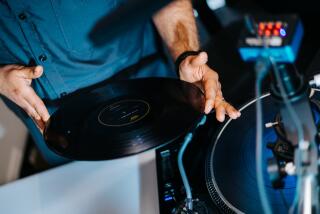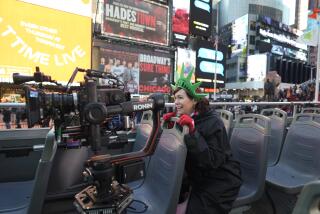COMPANY TOWN : Dream Machines : Home Recording Advances Are Good News for Some, a Dark Cloud for Others
- Share via
In his West Los Angeles living room, Joseph Armillas presses on the black and white keys of his synthesizer and the machine sings like a violin. With a flip of a switch, the same keyboard will produce the low, brassy sound of a trombone. Press another button and out comes a steady percussion beat.
Single-handedly, Armillas builds his orchestra, layer by layer, using a handful of sophisticated machines capable of perfectly imitating any musical instrument. When he’s done composing and arranging, he uses a digital recorder and a Macintosh computer to mix the many “instruments” into a two-track stereo recording. Until recently, this feat would have required many musicians playing real instruments in a professional recording studio.
With their high-tech toys and technical know-how, Armillas and thousands of musicians like him are changing the dynamics of the recording industry. With an investment of $5,000 or less, they are building home studios that strike a blow to professional recording facilities and to the musicians who make their living playing for everything from film scores to commercial jingles. At the same time, the new technology makes it much easier for new musical groups to cut an album and break into the business.
“It’s really changed the industry quite a bit,” said Armillas, who also runs a recording studio for the local chapter of the Musicians’ Union in Hollywood.
In years past, a Coca-Cola commercial might employ up to 40 musicians in a professional recording studio. But today, “it’s cheaper for someone to hire one good composer-arranger and play things on a synthesizer than to hire a whole orchestra,” Armillas said. “A lot of people that were enjoying a good salary found that two-thirds of their salary was gone overnight.”
The dual trends of falling prices and rising quality in the world of consumer electronics has made it possible to purchase all the elements of a respectable recording studio--multitrack recorder, mixing deck to convert a recording into two-track stereo, speakers and a few incidentals--for $5,000 or less.
“Home studios have now become the big rage,” said Kevin Clark, a studio musician and mixer who has set up a modest studio in his La Canada home. “If you’ve got a brain in your head, you can make a fine-sounding recording in your living room.”
Even musicians who plan to use a professional studio can use home studios to choose their arrangements, select a drum beat and complete other pre-production work at little cost.
“It’s mainstream,” said Ron Wallace, president of the Creative Musicians Coalition, an organization founded nine years ago to help musicians learn to take advantage of technology.
“Big guys are using it and small people are using it. Dreams are coming true because of this.”
Dreams of cutting a record on a shoestring, for example. Jimmy Thrill Quill and Danny Harvey of the country rock band Big Rig Jacknife spent $600--”That’s a lunch at Warner Bros.,” Quill quips--to make a record that has already sold 2,000 copies.
“Record companies will not sign a band anymore unless they have an independent deal or have done their own record, and [it used to be that] the only way you would have your own record is if you have a trust fund,” Quill said.
Not anymore. Thrill and Harvey set up a studio for just $3,000 in a spare bedroom in Harvey’s Canyon Country home.
The ability to make an inexpensive recording is critical for upstart bands, said Roger Maycock, a marketing representative for Tascam, a Montebello company that sells recording equipment for professional and home studios.
“For the music industry, this has become invaluable,” he said.
Techno-music makers have hired all kinds of musicians to play a few notes into a digital recorder for $500 a session. Other musical sounds can be mail-ordered and delivered on computer disks or downloaded from the Internet.
Since the notes are recorded digitally, they sound exactly like the original instruments and the quality of the sounds barely degrades over time. The sounds can be programmed into an electronic keyboard or sequencer, then replayed by simply tapping the keys.
“I just mixed a movie-of-the-week. The entire score was gorgeous, but there wasn’t a live player in it,” Clark said.
Big-budget movies still spring for full orchestras, but gigs in professional recording studios are becoming increasingly rare. That new reality has not escaped the attention of the 100 or so recording studios along the Burbank-Hollywood-Los Angeles corridor that together take in about $40 million to $50 million a year. Studio managers say the growth of home studios has put some smaller competitors out of business.
Since 1980, the number of mainstream professional studios recording audio for release on CDs and cassettes has declined precipitously while the number of home-based studios has mushroomed to roughly 1 million, according to Martin Polon of Polon Research International in Newton, Mass., a forecasting firm that specializes in the electronic entertainment industry.
About 600,000 of the home studios have been set up by musicians for their own use. The rest are operated as competitors to mainstream studios. About 100,000 of them create a consistent cash flow, Polon said.
“They are operating against zoning codes and using residential phone lines and residential power rates and do not have to comply with the building codes they would need to meet if they were operating legitimately,” he said.
Maycock said recording studios are partly responsible for driving the growth in home studios because the rents they charge are usually hundreds of dollars an hour.
“It’s expanding exponentially due to the fact that major studio time is so prohibitively expensive nowadays, and that makes it very difficult to focus on the creative task at hand,” he said.
At Village Recorder, a modest recording facility in West Los Angeles, artists arrive with much of their pre-production work completed, said chief engineer Jay Abtista.
“A lot of the home equipment nowadays is so sophisticated that they don’t use the studios for some of the things they used to use studios for, and that hurts,” he said. “I know a lot of studios that have closed down.”
Many have made changes to avoid that fate. Since musicians are doing more recording at home, Record Plant is investing more heavily in mixing equipment, said Rick Stevens, chairman of the large Hollywood recording facility.
Also, musicians still depend on the professional studios for certain amenities.
“Regular recording studios still offer things that a home studio can’t, like a big mixing console,” said Dan Tinen, a technical applications specialist for Alesis, a rival of Tascam.
“If you want to cut drums, it’s hard to do in a garage because there are airplanes flying over.”
Although they say home studios are cutting into their business, many studio managers see this as part of a continuing trend. Musicians are constantly finding new and different uses for studios, they say, and when one need seems to vanish, another usually comes along to take its place.
Back in the 1970s, for example, musicians regularly rented space in professional studios to write songs. Later they began composing at home but were still willing to spend hours in a professional studio recording a three-minute guitar solo. These days, the vacancies created by home studios are being filled by multimedia creators who need music for their productions.
Of course, true artists insist that while technological know-how is increasingly important, it will never replace musical ability.
“You still have to have talent,” Wallace said. But with the aid of technology, “people who have talent are now able to show off their talent better than they were before.”
(BEGIN TEXT OF INFOBOX / INFOGRAPHIC)
Recipe for a Home Studio
Home-based studios have grown from a handful in 1980 to 1 million in 1995, while professional recording studios have shrunk from 10,000 to 1,000 in the same period. Musicians--from hobbyists to aspiring rock stars--can set up a professional-quality studio at home for less than $5,000. Here’s what that will buy you:
Item / Price
Multitrack cassette recorder with integrated mixing console: $319 - 1,899
Digital audiotape mastering machine: $1,099 - 6,299
Cables: $200
Speakers: $100 -- 300 per pair
Headphones: $60 -- 200 per pair
Source: Tascam
More to Read
The biggest entertainment stories
Get our big stories about Hollywood, film, television, music, arts, culture and more right in your inbox as soon as they publish.
You may occasionally receive promotional content from the Los Angeles Times.










